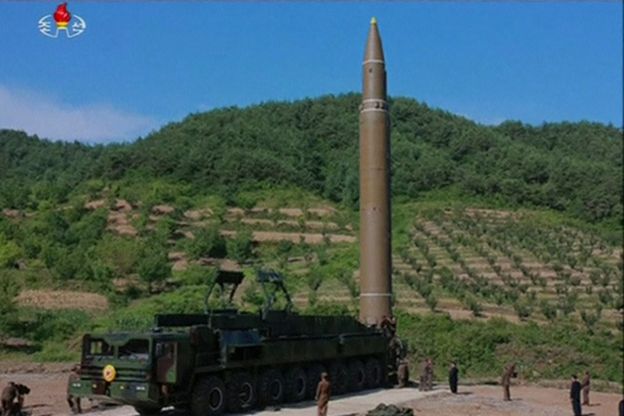North Korea hails 'ICBM test' success


North Korea says it has successfully tested its first "intercontinental ballistic missile" (ICBM).
A state television announcement said the missile, which landed in the Sea of Japan on Tuesday, could hit targets anywhere in the world.
But the US and Russia said the missile had a medium range and presented no threat to either country.
North Korea has increased the frequency of its missile tests, in defiance of a ban by the UN Security Council.
The announcement on North Korea state television said the Hwasong-14 missile test was overseen by leader Kim Jong-un.
It said the projectile had reached an altitude of 2,802km (1,731 miles) and flew 933km for 39 minutes before hitting a target in the sea.
- Have North Korea's missile tests paid off?
- What can the outside world do?
- How advanced is North Korea's nuclear programme?
- North Korea's missile programme
North Korea, it said, was now "a full-fledged nuclear power that has been possessed of the most powerful inter-continental ballistic rocket capable of hitting any part of the world".

North Korean state TV released photos of the purported ICBM test launch
It would enable the country to "put an end to the US nuclear war threat and blackmail" and defend the Korean peninsula, it said.
While Pyongyang appears to have made progress, experts believe North Korea does not have the capability to accurately hit a target with an ICBM, or miniaturise a nuclear warhead that can fit onto such a missile.
Other nuclear powers have also cast doubt on North Korea's assessment, with Russia saying the missile only reached an altitude of 535km and flew about 510km.
What is an ICBM?
- A long-range missile usually designed to carry a nuclear warhead
- The minimum range is 5,500km (3,400 miles), although most fly about 10,000km or more
- Pyongyang has previously displayed two types of ICBMs: the KN-08, with a range of 11,500km, and the KN-14, with a range of 10,000km, but before 4 July had not claimed to have flight tested an ICBM. It is not clear what differentiates the Hwasong-14
How far could this missile travel?
The big question is what range it has, says the BBC's Steven Evans in Seoul. Could it hit the United States?
David Wright, a physicist with the US-based Union of Concerned Scientists, says that if the reports are correct, this missile could "reach a maximum range of roughly 6,700km on a standard trajectory".
That range would allow it to reach Alaska, but not the large islands of Hawaii or the other 48 US states, he says.
It is not just a missile that North Korea would need, our correspondent adds. It must also have the ability to protect a warhead as it re-enters the atmosphere, and it is not clear if North Korea can do that.
What does this test tell us? By defence expert Melissa Hanham
Once again North Korea has defied the odds and thumbed its nose at the world in a single missile launch. With the test of the Hwasong-14, it has shown that it can likely reach intercontinental ballistic missile ranges including putting Alaska at risk.
Kim Jong-un has long expressed his desire for such a test, and to have it on the 4 July holiday in the US is just the icing on his very large cake.
Despite this technical achievement, however, it is likely many outside North Korea will continue to be sceptical of North Korea's missile. They will ask for proof of working guidance, re-entry vehicle, and even a nuclear warhead.
From a technical perspective, though, their engines have demonstrated ICBM ranges, and this would be the first of several paths North Korea has to an ICBM with even greater range.
Are neighbours and nuclear powers concerned?
South Korea's President Moon Jae-in has called on the UN Security Council to take steps against North Korea.
Japan described "repeated provocations like this are absolutely unacceptable" and Prime Minister Shinzo Abe said his country would "unite strongly" with the US and South Korea to put pressure on Pyongyang.
US President Donald Trump also responded swiftly on Tuesday.
On his Twitter account he made apparent reference to North Korean leader Kim Jong-un, saying: "Does this guy have anything better to do with his life?"
"Hard to believe that South Korea and Japan will put up with this much longer. Perhaps China will put a heavy move on North Korea and end this nonsense once and for all!"
 REUTERS
REUTERS
North Korean state TV said the launch was overseen by leader Kim Jong-un
President Trump has repeatedly called on China, Pyongyang's closest economic ally, to pressure North Korea to end its nuclear and missile programmes.
On the prospect of North Korea being able to strike the US, he tweeted in January: "It won't happen". However experts say it might - within five years or less.
Beijing called for "restraint" following the latest test on Tuesday.
Foreign ministry spokesman Geng Shuang said China was opposed to North Korea going against clear UN Security Council resolutions on its missile launches.
Meanwhile, a spokesman for Prime Minister Theresa May said the UK "stood alongside the US and our allies to confront the threat North Korea poses to international security".





So, how do we respond? Well the first thing that we as Americans to is to ignore the response of the person who is in the Oval Office. He is completely uneducated in not just foreign policy, but even in the very basics of American history and how our nation has related and responded to world developments in the past. He has no understanding that may tip the very delicate balance that exists in the region. He has no concept of what the Korean War was about. What caused it, how we became involved in it how it was really not resolved and is almost certainly not aware that it is still an active war. He is certainly ready to puff up his chest because it will pump up his “ratings” at home, but doesn't have the slightest concept of how many hundreds of thousands of innocent people will die if he does.
As for the region itself the very best thing they and indeed the rest of the world could do when it comes to any involvement concerned America in any foreign policy is to ignore America. To just treat America as a non-player as long as this highly uneducated and ignorant leader is in charge. All other nations, especially those in the hottest parts of the world would serve their own best interests by pushing America away and actively demanding that America stays out of their issues and problems and issues because of the fact that the current leader will almost certainly cause it to become much worse with his ignorant blundering and lack of knowledge of the history of the problems of the particular region and his incredibly tiny lack of attention span that prevents him from learning about them.
The plain and simple truth is that when it comes to ANYTHING that involves foreign policy conflicts, is that the rest or the world on all sides would be better served to actively push the United States as far away as possible as long as this ignorant, uneducated and pathetically unqualified creature is in the White House.